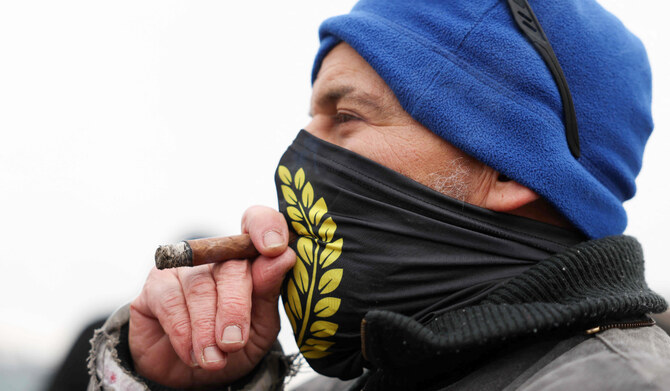WASHINGTON: A day after US President Donald Trump’s sweeping grant of clemency to all of the nearly 1,600 people charged in connection with the 2021 attack on the US Capitol, America’s far-right celebrated. Some called for the death of judges who oversaw the trials. Others partied and expressed relief. Some even wept with joy.
Several experts who study extremism said the extraordinary reversal for rioters who committed both violent and nonviolent crimes on Jan. 6, including assaulting police officers and seditious conspiracy, will embolden the Proud Boys and other extremist groups such as white supremacists who have openly called for political violence.
In a few pen strokes, Trump reversed the largest US Justice Department investigation and prosecution in history, as he attempted to rewrite what happened during the violent riot on Jan. 6, 2021. As he took office for a second term on Monday, Trump continued to claim, falsely, that the 2020 election was rigged and that he was the rightful winner. He has described the riots as a peaceful “day of love” rather than a melee aimed at overturning the results of the 2020 US presidential election.

William Sarsfield, who was released from serving time for his charges related to January 6, 2021 attack on the U.S. Capitol, wears his prison shoes, after U.S. President Donald Trump made a sweeping pardon of nearly everyone charged in the January 6, 2021 attack, in Washington, U.S. January 21, 2025. (REUTERS)
“We’re not going to put up with that crap anymore,” Trump said at a post-inauguration rally on Monday, describing the Jan. 6 offenders as “hostages.”
For the convicted Jan. 6 defendants, and for the Trump faithful, the pardons were vindication for unjust persecutions by the president’s political enemies.
Gavin McInnes, the British-born founder of the Proud Boys, said in an interview that he and his friends were celebrating late on Monday by “pounding bourbons and laughing our heads off.”
Before the 2020 election, Trump told the Proud Boys – a violent all-male extremist group – to “stand back and stand by.” Three months later, federal prosecutors say, the group’s leaders plotted the Jan. 6 attack.
“This is a victory for us,” said McInnes, now a right-wing podcaster. If Trump hadn’t given all the Proud Boys clemency, the president would have been “dead to me, and Proud Boys and MAGA and everyone,” he said. “But luckily that didn’t happen.”
In a video posted online shortly after the pardons, convicted rioter Christopher Kuehne, a Marine veteran from Kansas who traveled to Washington with the Proud Boys in January 2021, sobbed: “I am finally free. I don’t even have the words to thank President Trump for what he has done for us.” He was sentenced in February to 75 days in prison and 24 months of supervised release for obstructing law enforcement.
Another Proud Boy told Reuters the pardons would help recruit more members. “A lot of people stayed away from us after there were arrests,” he said, speaking on condition of anonymity. “Now they are going to feel like they are bulletproof.”
The riot began after Trump rallied thousands of supporters to march on the Capitol on Jan. 6, 2021, as Congress certified Democrat Joe Biden’s victory. Inspired by Trump’s baseless rigged-election claims, they swarmed the Capitol, setting off pitched battles with police. Some bludgeoned officers with makeshift weapons that included metal pipes, wooden poles and baseball bats. Prosecutors said the rioters carried firearms, tasers, swords, hatchets and knives.
Four people died on the day of the attack, including a woman protester shot by police. One Capitol Police officer who fought the rioters died the next day. Another 140 officers were injured. Four officers who responded to the riot later committed suicide.
Norm Pattis, a defense attorney who represents three Proud Boys and the leader of the Oath Keepers, a militia, dismissed the notion that the sweeping clemency would somehow lead to an increase in political violence.
“Our politics has always been violent,” Pattis said, pointing to events ranging from the US Civil War to the protests in the 1960s. “And so a few-hours riot at the Capitol is going to warrant years, decades behind bars? For some people, it’s disproportionate, and in my view just repulsive.”
“YOU NEED ACCOUNTABILITY”
Two police officers who were beaten while trying to hold off the crowd said the pardons were a chilling sign that loyalty to Trump is now more important than the rule of law.
“It’s outrageous,” former DC Metropolitan Police Officer Michael Fanone told Reuters. Fanone suffered a heart attack and a brain injury after he was beaten, sprayed with chemical irritants and shocked with a stun gun during the Jan. 6 violence. Fanone, 44, who spent 20 years as a police officer, said the pardons likely will inspire other supporters to violence, “because they believe Donald Trump will grant them a pardon. And why wouldn’t they believe that?”
Aquilino Gonell, a former US Capitol Police sergeant who was injured defending the Capitol, said Trump’s pardons had nothing to do with righting an injustice. Trump and his Republican allies “have lost their claim to having moral high ground when defending our system of governance, the constitution, and supporting the police,” he said.
Among the pardoned were more than 300 who pleaded guilty to either assaulting or obstructing law enforcement, including 69 who admitted to assaulting police with a dangerous or deadly weapon. Trump’s order commuted the sentences of 14 convicted of serious crimes, including Stewart Rhodes, former leader of the Oath Keepers. Trump also issued pardons for others, including former Proud Boys leader Enrique Tarrio, sentenced to 22 years for seditious conspiracy.
Nearly 300 rioters had links to 46 far-right groups or movements, according to a study from the National Consortium for the Study of Terrorism and Responses to Terrorism, a University of Maryland-based network of scholars that tracks and analyzes terrorist incidents.
Heather Shaner, a Washington lawyer who served as a court-appointed defense attorney for more than 40 of the defendants, called the pardons an attempt to whitewash history. “You need accountability,” she said in an interview. “Only by acknowledging the truth and providing accountability can you move forward.”
Some political extremism experts said the pardons would incentivize pro-Trump vigilantes to commit violence under the belief they’ll receive legal immunity if they act in the interests of Trump. “They are going to feel they can do whatever they want,” Julie Farnam, who was the assistant director of intelligence for the US Capitol Police during the Jan. 6 riots, said of far-right groups. “
They’ll feel like they can because there is no leadership in the United States that tries to stop it,” said Farnam, who now runs a private investigative agency.
Couy Griffin, who was stripped of his seat as a New Mexico county commissioner after he was convicted of trespassing on Capitol grounds, said he instructed his attorney to decline Trump’s pardon, as he appeals his conviction in federal court. In an interview, Griffin said he believes Trump’s enemies distorted the truth about the Capitol riots.
“Was there some violence against police officers? Yes, there was also a lot of violence of police officers against the crowd,” he said, echoing a frequent complaint of Trump supporters.
DEATH THREATS TO JURISTS, POLITICIANS
Many Trump supporters praised the pardons in right-wing online forums. Some threatened those who supported the prosecutions.
On the pro-Trump website Patriots.Win, at least two dozen people expressed hopes for executions of Democrats, judges or law enforcement linked to the Jan. 6 cases. They called for jurists or police to be hanged, pummeled to death, ground up in wood chippers or thrown from helicopters.
“Gather the entire federal judiciary into a stadium. Then have them listen and watch while the judges are beaten to death,” one wrote. “Cut their heads off and put them on pikes outside” the Justice Department.
Others called for killing Trump’s political critics after former House of Representatives Speaker Nancy Pelosi, an influential Democrat, called the pardons “an outrageous insult.” “If someone successfully whacked Pelosi, I would consider them a hero,” one Patriots.Win commenter wrote. Another wished for Liz Cheney, the Republican who defied Trump by spearheading the congressional investigation of the violence, to “hang.”
One of the most famous rioters, Jake Angeli-Chansley, who became known as the “QAnon Shaman” for wearing a horned hat in the Capitol, took to the social media platform X to celebrate after the pardons. Sentenced to 41 months in prison in 2021, he was released from federal custody in 2023.
“NOW I AM GONNA BUY SOME MOTHAFU*KIN GUNS!!! I LOVE THIS COUNTRY!!! GOD BLESS AMERICA!!!”

















